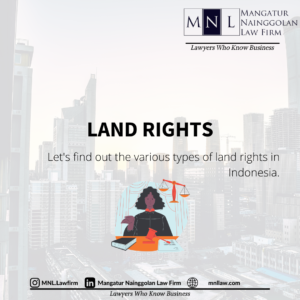What is the Right to Land? What are the rights to land according to Agrarian Law?

The Right of Control over land, also called land rights, is the authority, obligations, and/or prohibitions for the holder of the right to do something concerning the land they possess.
In National Land Law, there are various rights of control over land, which can be categorized as follows:
1.Indonesian People’s Rights
This right is the highest form of land control in National Land Law. It consists of two elements: ownership and the authority to regulate and lead the collective control and use of land within its jurisdiction. The holder of this right is the entire Indonesian population, and the land subject to this right includes all land within the territory of the Republic of Indonesia. The right of the people is a perpetual legal relationship.
2. State Control Rights
State control rights include land that has already been owned by individuals or legal entities and land that has not yet been owned or claimed. The difference for land already owned is that the state’s control rights are limited by the existing rights held by individuals or legal entities. In contrast, for land without existing rights, the state’s control is more extensive and comprehensive. The subject of State Control Rights is the Republic of Indonesia, and the land subject to this right includes all land within the territory of the Republic of Indonesia.
3. Customary Rights of Indigenous Communities, as long as they still exist in reality
Customary Rights consist of a set of authorities and obligations of an indigenous customary community related to the land located within its territorial jurisdiction. The holder of Customary Rights is the indigenous customary community, and the object of these rights is all land within the territorial area of the respective indigenous customary community.
4. Individual Rights
According to National Land Law, land can be owned and possessed by individuals, jointly with others, and legal entities, in accordance with the applicable laws. However, only Indonesian citizens can have a complete relationship with the land, water, and airspace within the territory of the Republic of Indonesia.
Types of individual rights to land include:
- Primary Rights: Ownership Rights, Rights to Cultivate, and Rights to Build, granted by the state.
- Secondary Rights: Building Rights and Usage Rights, granted by the landowner, as well as Mortgage Rights, Profit-Sharing Business Rights, Rights to Occupy, Lease Rights, and others.
5. Endowment (Wakaf) Rights of land assurance: Mortgage Rights (Hak Tanggungan)
These are the various rights to land according to Indonesian Agrarian Law. Each of these rights carries specific authorities and obligations for the respective holders, and they are subject to different regulations and limitations under the law.
